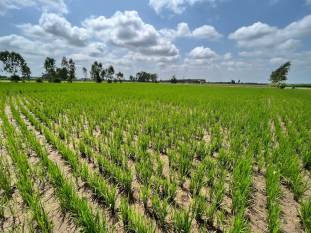MUMBAI, 9 August 2023: In a groundbreaking collaboration, Bayer, GenZero, and Shell Energy India Private Limited, alongside other experts, have embarked on a mission to combat methane emissions in rice cultivation.
This joint effort aims to develop a robust model showcasing the scalability of methane emissions reduction, presenting a crucial solution for climate change and sustainable agriculture.
The alliance is set to revolutionize rice farming by offering training, support, and guidance to smallholder farmers. Utilizing advanced Measurement, Reporting & Verification (MRV) mechanisms combined with remote sensing technology, the approach intends to create a benchmark for reducing methane emissions in rice cultivation while ensuring long-term environmental sustainability.
Paddy rice cultivation contributes to a significant share of global methane emissions, a potent greenhouse gas with alarming global warming potential. Covering 15% of the global farm area and consuming a substantial portion of freshwater resources, rice cultivation's environmental impact is undeniable. To counteract these challenges and curb global temperature rise, this collaborative effort aims to drive widespread methane emissions reduction in rice farming.
Bayer has laid the groundwork for this initiative with its pilot Sustainable Rice Project in India over the past two years. By promoting alternative practices such as Alternate Wetting and Drying (AWD) and Direct Seeded Rice (DSR), the project has sought to reduce carbon emissions by transforming rice cultivation methods.
The collaboration's first-year goal is to expand its coverage to encompass 25,000 hectares of rice cultivation during the Kharif 2023 and Rabi 2023-24 seasons. Success in this initial phase will pave the way for the implementation of an even more extensive sustainable rice project. Beyond mitigating greenhouse gas emissions, this program is anticipated to yield additional benefits like water conservation, improved soil health, and enhanced livelihoods for smallholder rice farmers.
Scientific rigor is ensured by the participation of the International Rice Research Institute (IRRI), which will conduct thorough assessments of greenhouse gas reductions, water use efficiency, and soil health improvements.
Simon-Thorsten Wiebusch, Country Divisional Head of Bayer for India, Bangladesh & Sri Lanka, emphasized the program's dual purpose of addressing food security and climate change. This partnership leverages the expertise of organizations like GenZero, Shell, and IRRI to drive the adoption of sustainable practices for a more sustainable future.
GenZero's CEO, Frederick Teo, underscored the urgency of decarbonizing rice cultivation to combat climate change and enhance food security. The collaboration aims to introduce innovative techniques across Indian smallholder farmers, reducing water usage and methane emissions.
Flora Ji, Vice President of Nature Based Solutions at Shell plc, highlighted the significance of nature-based solutions in climate change mitigation and sustainable development. The collaboration aligns with Shell's commitment to deploying such solutions at scale.
The collective efforts of Bayer, GenZero, Shell, IRRI, and other contributors stand as a promising stride toward minimizing the environmental impact of rice cultivation and fostering a sustainable future.




















